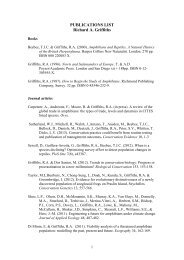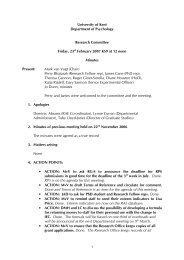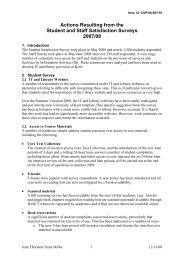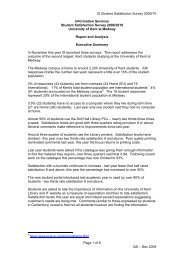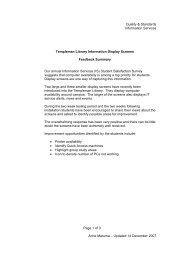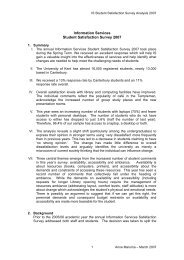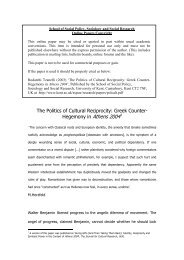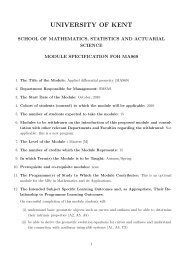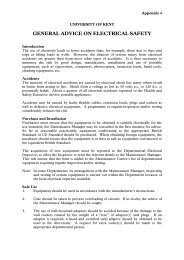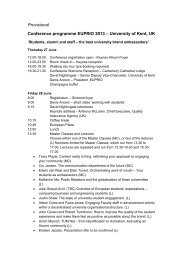The Million Pound Donors Report 2012 - University of Kent
The Million Pound Donors Report 2012 - University of Kent
The Million Pound Donors Report 2012 - University of Kent
Create successful ePaper yourself
Turn your PDF publications into a flip-book with our unique Google optimized e-Paper software.
TOP TIPS<br />
FOR<br />
DOnORS<br />
When we speak to donors, we ask them to share their ‘top tips’ on<br />
giving donations worth £1 million or more. Here’s what they said:<br />
• Find out what you are passionate about and really work<br />
out why you want to tackle that particular problem. As a<br />
donor it’s too easy just to respond to requests, but you<br />
need to ask yourself: why this and not something else?<br />
• If you want to keep personal control over your funding<br />
decisions then you need to pick something that you<br />
know about.<br />
• Allow yourself time to experiment, don’t think you have<br />
to have a perfect philanthropic strategy on day one, but<br />
try and end up with a strategy and a focus.<br />
• Work out what most interests you, because you’re only<br />
going to be good at supporting it if it interests you. But<br />
also keep an open mind because you may discover new<br />
areas that you didn’t originally know you would be<br />
enthusiastic about.<br />
• As well as giving money, try to get involved with the<br />
causes you support. <strong>The</strong>re’s nothing wrong with just<br />
handing over the money but I think it’s like seeing the<br />
first half <strong>of</strong> a film then deciding not to see the second<br />
half! By getting involved in what the people we fund<br />
are doing, we get to see the complete story.<br />
• Try to provide sustained support over a longer period <strong>of</strong><br />
time. Whilst charities are obviously delighted to receive<br />
a one-<strong>of</strong>f seven-figure sum, donors who give slightly<br />
less but over a longer period <strong>of</strong> time are potentially<br />
even more valuable.<br />
• When you’re starting out, don’t try to do everything<br />
yourself and be prepared to pay for good help and<br />
support.<br />
• Training for all trustees is essential, and do <strong>of</strong>fer to<br />
reimburse your trustees’ expenses – even if it’s not<br />
taken up, it’ll be appreciated.<br />
• Do what you can do with what you have… Just try it by<br />
selecting a worthwhile project that will make a<br />
difference in other people’s lives. Stay close to that<br />
project, get regular reports and enjoy seeing the effects<br />
your money is having.<br />
• Don’t just write a cheque and disappear. If you get<br />
involved and are part <strong>of</strong> the process <strong>of</strong> improving things<br />
in a personal way, then I guarantee the rewards will be<br />
far greater than you ever imagined.<br />
aPPendIces | the MIllIon PoUnd donors rePort <strong>2012</strong><br />
• Do try to meet other donors and talk to them about<br />
their experiences, because that will teach you a lot –<br />
even if it’s just what not to do!<br />
• If you are comfortable to do so, work with the charity to<br />
make a public announcement about your donation.<br />
‘Going public’ can help to raise the pr<strong>of</strong>ile <strong>of</strong> the<br />
organisation and encourage other donors to come<br />
forward.<br />
• Don’t make unreasonable demands <strong>of</strong> the charities you<br />
support. <strong>The</strong> feedback you request should be<br />
proportionate to the size <strong>of</strong> your gifts and should not go<br />
on for years after the money has been spent.<br />
• Consider contributing to the endowment <strong>of</strong> the<br />
organisations you care most about to help them put<br />
down roots and build a solid foundation. Endowments<br />
are a hard sell to UK donors, because they lack the<br />
urgency <strong>of</strong> other fundraising requests, yet they are a<br />
priority for institutions that seek stability and security.<br />
• Think about your philanthropy as a way <strong>of</strong> educating<br />
your children – it can help them learn how to handle<br />
the responsibilities that come with inheriting wealth.<br />
• Make donations that will transform the organisations<br />
you care about. Think about how your contribution can<br />
have the biggest effect over the longest time period<br />
– that probably means supporting the charity’s<br />
capacity-building rather than simply funding a building<br />
or a project.<br />
• Try to stick with a charity or a cause for a long time<br />
instead <strong>of</strong> making lots <strong>of</strong> short-term grants to many<br />
different organisations.<br />
• Give something back to the people and places that have<br />
helped to create your wealth.<br />
• Be prepared to fund campaigns as well as more tangible<br />
things. If the campaign is a success then your money<br />
will have a massive and long-lasting impact.<br />
• Be open to funding core costs, such as salaries and<br />
heating bills, rather than just projects. Core funding<br />
liberates charity leaders from constantly scrambling for<br />
income to cover their daily expenses and enables them<br />
to concentrate on delivering the organisation’s mission.<br />
31



